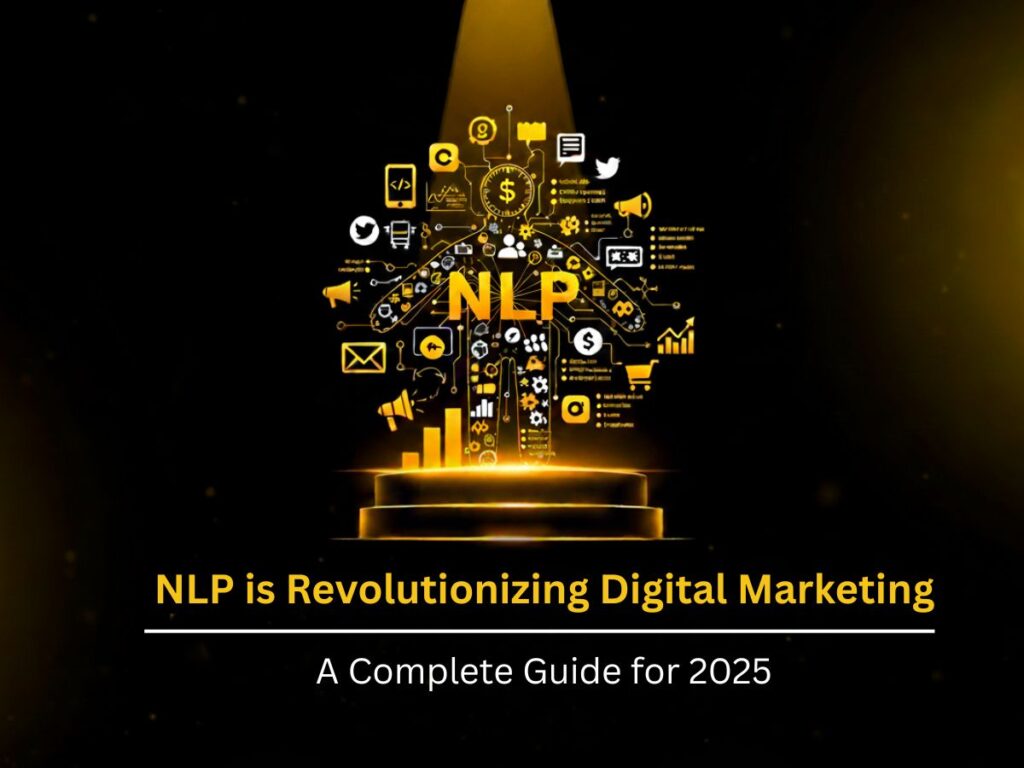The landscape of digital marketing is undergoing a seismic shift as Natural Language Processing transforms how brands connect with their audiences. Consider the case of a Dubai-based e-commerce company that implemented NLP-powered chatbots in early 2024. Within six months, they witnessed a 47% increase in customer engagement rates, a 31% boost in overall conversion rates, a 60% reduction in customer service response time, and significant improvement in customer satisfaction scores.
Natural Language Processing has evolved from a futuristic concept to an indispensable tool in modern online marketing strategies. As we navigate through 2025, businesses that harness NLP technologies are gaining unprecedented advantages in understanding customer behavior, personalizing content, and optimizing their web marketing strategies for maximum impact.
Understanding Natural Language Processing in Modern Marketing
Natural Language Processing represents the bridge between human communication and machine understanding. In the context of performance marketing, NLP enables computers to interpret, analyze, and generate human language in meaningful ways.
Key capabilities of NLP in marketing include:
- Processing vast amounts of unstructured customer data
- Analyzing social media conversations and reviews
- Understanding customer sentiment and emotions
- Extracting insights from email interactions
- Interpreting search query patterns
The technology identifies behavioral patterns that would be impossible to detect manually. For businesses focused on online brand promotion, NLP provides the intelligence needed to craft messages that truly resonate.
Marketing automation systems now leverage NLP to understand customer preferences at a granular level. This enables highly targeted communications that feel personal rather than generic.
Transforming Content Marketing Through Intelligent Analysis
Content marketing has entered a new era where NLP algorithms determine what resonates before writers create content. These systems analyze millions of successful articles to identify engagement patterns.
NLP enhances content creation through:
- Identifying trending topics in real-time
- Suggesting relevant keywords automatically
- Predicting content performance across platforms
- Optimizing headlines for maximum impact
- Analyzing competitor content strategies
Top digital marketing companies leverage NLP to streamline their content workflows. The technology eliminates much of the guesswork traditionally associated with content strategy.
NLP-powered tools enable content personalization at unprecedented scale. Rather than creating generic messages, marketers generate variations tailored to specific segments.
Each version maintains brand consistency while addressing unique customer pain points. This approach dramatically improves engagement and conversion rates.
Revolutionizing SEO Services with Semantic Understanding
The best digital marketing agency teams recognize that SEO has evolved beyond simple keyword matching. Modern SEO services require understanding search intent, context, and semantic relationships.
NLP transforms SEO through:
- Identifying valuable long-tail keywords
- Understanding user search intent
- Uncovering related search queries
- Optimizing for semantic relevance
- Analyzing SERP patterns effectively
Search engines themselves use sophisticated NLP models to understand content meaning. Google’s BERT and MUM algorithms represent significant advances in matching user intent.
Marketers who optimize for semantic search achieve better rankings. They attract more qualified traffic by focusing on meaning rather than exact keyword matches.
This shift requires creating comprehensive content that answers related questions. NLP tools help identify these semantic opportunities efficiently.
Enhancing Customer Experience with Conversational AI
Conversational interfaces powered by NLP have become essential customer touchpoints. Modern chatbots understand context, remember interactions, and respond naturally.
Benefits of NLP-powered conversational AI:
- 24/7 customer support availability
- Instant response to common queries
- Personalized product recommendations
- Seamless order tracking assistance
- Continuous learning from interactions
For e-commerce digital marketing, these systems handle everything from product questions to purchase support. They improve customer satisfaction while reducing operational costs.
Voice search optimization represents another critical NLP application. As more consumers use voice assistants, businesses must adapt their strategies.
Optimizing for conversational queries requires understanding natural language patterns. Content must be formatted to provide concise, voice-friendly answers.
Powering Social Media Marketing with Sentiment Analysis
Social media platforms generate enormous volumes of customer conversations. NLP-driven sentiment analysis processes these discussions to gauge public opinion.
Sentiment analysis capabilities include:
- Real-time brand mention monitoring
- Emotion detection in customer feedback
- Crisis identification and alerting
- Competitor sentiment comparison
- Trend identification and tracking
A full-service marketing firm uses sentiment analysis to identify emerging issues early. Real-time monitoring enables rapid response before situations escalate.
Beyond crisis management, sentiment analysis informs content strategy. Understanding emotional responses to specific features guides product development decisions.
The technology also reveals how customers feel about competitor offerings. This intelligence provides valuable insights for positioning strategies.
Optimizing PPC Advertising with Predictive Analytics
PPC advertising has become increasingly sophisticated with NLP integration. The technology analyzes ad copy performance across different audience segments.
NLP enhances PPC campaigns through:
- Identifying high-performing linguistic elements
- Predicting ad variation success rates
- Optimizing audience targeting strategies
- Reducing wasted advertising spend
- Accelerating path to profitability
Predictive models forecast which ad variations will perform best. This capability reduces testing time and budget waste significantly.
NLP also enhances audience targeting beyond basic demographics. Marketers target based on interests, values, and communication styles revealed through language.
This granular targeting improves campaign relevance. Higher relevance translates to better click-through rates and conversion performance.
Streamlining Marketing Automation and Personalization
Marketing automation platforms enhanced with NLP deliver genuinely human personalization. These systems analyze customer interactions across multiple channels comprehensively.
NLP-powered automation benefits:
- Comprehensive behavioral profiling
- Intelligent email personalization
- Dynamic content recommendations
- Optimal send time prediction
- Cross-channel journey orchestration
For real estate digital marketing, this means property recommendations matching lifestyle aspirations. The system recognizes subtle preferences expressed in customer communications.
Email marketing campaigns benefit enormously from NLP optimization. Subject line testing, content personalization, and call-to-action optimization all improve.
The technology identifies which phrases generate opens and which messaging styles resonate. This intelligence continuously refines campaign performance.
Leveraging NLP for Competitive Intelligence
Understanding competitor strategies becomes accessible when NLP tools analyze their digital footprint. These systems monitor websites, social media, and advertising automatically.
Competitive intelligence applications:
- Tracking competitor messaging trends
- Identifying positioning changes
- Discovering market opportunities
- Analyzing customer review patterns
- Monitoring pricing strategies
Digital marketing for small businesses particularly benefits from this capability. Resource-constrained teams gain enterprise-level insights without dedicated research staff.
The technology analyzes customer feedback about competitors extensively. This reveals strengths to emulate and weaknesses to exploit.
Competitive intelligence informs positioning strategies effectively. Businesses can differentiate their online brand promotion based on genuine market gaps.
Implementing NLP in Local SEO Marketing Services
Local SEO marketing services have been transformed by NLP’s location-based understanding. The technology recognizes neighborhood names, landmarks, and regional terminology.
NLP advantages for local marketing:
- Understanding implicit location intent
- Analyzing local language variations
- Processing neighborhood-specific queries
- Extracting insights from local reviews
- Optimizing for “near me” searches
For businesses seeking an online marketing company near me, NLP ensures proper search visibility. The technology understands both service type and geographic specificity.
Review analysis helps local businesses understand what customers value most. This feedback loop informs service improvements and marketing messages.
Local businesses can emphasize their most appreciated aspects effectively. This targeted approach improves both search rankings and conversion rates.
Future Trends: What’s Next for NLP in Digital Advertising
The convergence of NLP with other AI technologies promises transformative capabilities. Multimodal models understanding both text and images create new optimization opportunities.
Emerging NLP trends include:
- Real-time multilingual translation
- Emotional AI detecting subtle cues
- Video content understanding
- Advanced voice interaction systems
- Predictive customer journey mapping
Real-time language translation will enable seamless global campaigns. Marketers will create content once and deploy it across markets automatically.
Emotional AI represents the next frontier in customer understanding. Systems will detect subtle emotional cues in communications.
This capability enables hyper-responsive marketing adapting to customer emotional states. The future of web marketing strategies lies in this intelligent responsiveness.
Implementing NLP: Practical Steps for Your Business
Starting with NLP integration doesn’t require massive technology investments. Many platforms offer built-in NLP capabilities through existing tools.
Implementation roadmap:
- Identify specific pain points for NLP application
- Start with high-ROI opportunities first
- Measure baseline performance metrics
- Deploy pilot programs strategically
- Scale successful implementations gradually
Focus first on areas with clear ROI potential. Customer service automation or content optimization often provide quick wins.
Measure baseline metrics before implementation. This enables quantifying the impact of NLP-powered improvements accurately.
Partner with experts who understand both technology and marketing strategy. A top digital marketing company can guide implementation while ensuring business alignment.
Measuring NLP Impact on Marketing Performance
Tracking the effectiveness of NLP initiatives requires comprehensive measurement frameworks. Businesses must establish clear KPIs aligned with strategic objectives.
Key metrics to monitor:
- Customer engagement rate improvements
- Conversion rate optimization results
- Cost per acquisition reductions
- Customer satisfaction score increases
- Revenue attribution from NLP channels
Advanced analytics platforms integrate NLP performance data. This provides holistic views of how language understanding drives business outcomes.
Regular performance reviews identify optimization opportunities. Continuous improvement ensures NLP investments deliver maximum value.
Attribution modeling becomes more sophisticated with NLP insights. Businesses understand how language-based interactions contribute to conversions.
FAQs About NLP in Digital Marketing
1. What is NLP in digital marketing?
NLP enables computers to understand human language, powering chatbots, sentiment analysis, and content optimization for improved customer engagement.
2. How is AI revolutionizing digital marketing?
AI automates tasks, predicts behavior, personalizes experiences at scale, and optimizes campaigns in real-time for maximum ROI.
3. How is AI revolutionizing digital marketing in 2025?
Advanced predictive analytics, hyper-personalization, generative content creation, and autonomous campaign management define AI’s 2025 marketing impact.
4. What are the four main types of digital marketing?
Search Engine Marketing, Content Marketing, Social Media Marketing, and Email Marketing form the core digital marketing channel types.
Conclusion
Natural Language Processing has fundamentally transformed digital marketing in 2025, moving from experimental technology to essential business infrastructure. Organizations embracing NLP-powered solutions gain competitive advantages through enhanced customer understanding, personalized experiences, and data-driven decision making. The integration of NLP across content marketing, SEO services, social media marketing, and customer engagement creates seamless experiences that drive measurable results. As internet marketing continues evolving, businesses investing in NLP technologies position themselves for sustained growth and market leadership in an increasingly AI-driven landscape.




